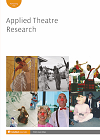
Full text loading...

The article presents and discusses etymological background, cultural adaptations and different perspectives to the key concepts in drama and theatre, starting from western and Chinese conceptions. Drama has at least three levels of meaning: (1) as an overarching concept for fictional and non-fictional cultural practices; (2) as an aesthetic learning practice within education; and (3) as a script made for theatre performances. The drama is thus a frame for the actions, and within this frame there might be other frames, marking different roles and perspectives. The meaning and potential for knowing in drama and theatre lie between those layers and differences. This idea is illustrated by a comparison between the British pioneers and partners Dorothy Heathcote and Gavin Bolton, and by exploring how divergent views on theatre and art lead to differences in perspective about a specific approach to educational drama, mantle of the expert.

Article metrics loading...

Full text loading...
References


Publication Date:
https://doi.org/10.1386/atr_00067_1 Published content will be available immediately after check-out or when it is released in case of a pre-order. Please make sure to be logged in to see all available purchase options.